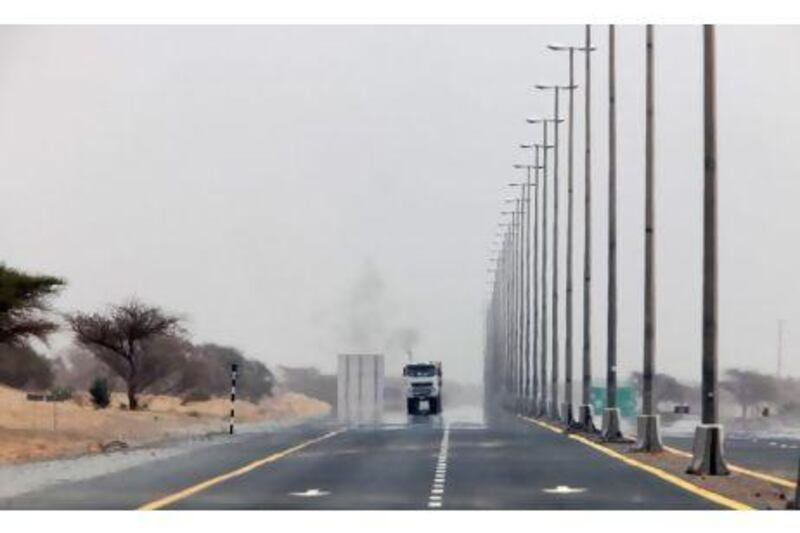Today the National concludes a three-day examination of the planned railway network intended to knit the nation more closely together. We began by explaining its importance to the wide-open west; yesterday we visited the industrial heartland; today we disembark in the lorry-ridden north.
With the announcement of the Union Railway, two dreams could finally come true for the residents of the Northern Emirates.
They are hoping the railway will breathe life into the less developed parts of the UAE, and help to relieve a relentless - and dangerous - flow of lorries.
"Wonderful, wonderful, wonderful!" said Ruwaya Salem, a 35-year-old mother of three from Adhen. "We need the railway here desperately."
One weekend last month the Salem family drove all the way to Dubai just to travel on the Dubai Metro.
"It was the first time we ever took a metro, and it was great," said Mr Salem. "I got to see Dubai from a very different angle. I can't wait to take a ride on the train and see the whole country from a different view."
Small, isolated and undeveloped, Adhen is a typical village in the south of Ras al Khaimah and on the outskirts of Fujairah. Al Dhaid Road is one of the main arteries connecting the villages to cities and towns, and it is dominated by an endless stream of lorries either transporting general supplies to the outlying areas or travelling to and from the quarries with heavy loads.
Flat tyres, said Mrs Salem, are a frequent annoyance, as are cracked windscreens from flying pebbles.
"We don't have anything here, and so we are forced to always drive along that dangerous road for the most basic of things, like going to a hairdresser," she said. "The trucks destroy the roads, and pollute the air and don't pay attention to safety measures."
Plans for railway tracks across the Northern Emirates are still being finalised, and a start date for the work has yet to be set, but the Union Railway is proposing a path through the main lorry bottlenecks, such as Al Dhaid, and along the main quarry sites near Hajar mountain. The tracks would also connect Port Saqr, and possibly the Ras al Khaimah International Airport, the coast of Fujairah and Khor Fakkan to Sharjah and Dubai.
The railway would cut lorry traffic by limiting their routes to short trips, leaving the long journeys to the freight trains.
While the project is still years from completion, businesses in the area are already making plans for expansion.
K Ali, from India, has worked at the 18-year-old Al Dafaf supermarket in Al Dhaid for the past seven years. The only fruits he can get his hands on are apples, bananas and, occasionally, oranges.
"First thing I will get are fresh strawberries," said Mr Ali, 42. "When you are far away from the main cities, you realise how hard it is to get things."
With products and merchandise limited to one or two brands, Mr Ali hopes that not only will the railway bring about greater variety, but a more comfortable mode of transport for its cargo.
"The poor animals have it the worst," he said. "They are tied up in the back of the pick-up or truck, and have to travel for hours, if not days, from one destination to another. Hopefully the trains will have air conditioning for the livestock."
After his experiences of taking the train in his home country of India, Mr Ali is not anxious to become a regular passenger.
"The one I went on was old, dirty and dangerous," he laughed. "I will just use the train for bringing in supplies, not travel."
Not everyone is thrilled at the prospect of a rail system.
"Because the roads are so bad, we always get a random car or truck coming in for repairs," said Mohammed Mohammed, 50, from Pakistan, working at Al Dhaid garage. "If the train comes, and the roads are fixed, who will come to us?"
While for many the railway means progress and profit, others are looking forward to quiet, peaceful travel.
"I will be able to sit back, contemplate, and write my poems, instead of worrying about reckless drivers flashing me as they rush by on the highway," said Mariam al Naqdi.
The Emirati poet commutes five days a week from her home in Khor Fakkan to work at the Nabati Poetry House in Sharjah.
"I was worried they wouldn't include Khor Fakkan, but when I saw the map online on the Union Railway website, I saw that we are marked and part of the network," she said. "I was so happy, as we are often forgotten in the bigger scheme of things."
The trip is usually 90 minutes but it can last an hour longer if traffic is bad. With the train, she hopes the commute will be quicker and safer.
"It will be great, I can relax, and take my son with me, without worrying about the road and accidents," she said. "He will look out the window, while I will sit and write my poetry."






